- Home
- Elizabeth George
Just One Evil Act il-18 Page 13
Just One Evil Act il-18 Read online
Page 13
The we got him as she’d hope it might. The we meant more was in the offing. The we meant there was a chance for The Source to lead a charge against the Met, and both of them knew that when it came to news, leading charges against the Met was a close second to having a salacious scoop on a Member of Parliament or a picture of an inebriated naked prince clutching at the crown jewels as someone snapped away with a mobile’s camera.
But still he was cautious, Mitchell Corsico. Caution in moments like these had got him where he was today, with a page-one by-line two or three times each week and every other tabloid in the country willing to offer him six figures to start digging up dirt. So he said, careful to sound noncommittal, “Why’s no other paper got this tale, then?”
“Because none of them have the whole story, Mitch.”
“Sordid, is it?” He meant sordid enough, of course.
“Oh, I think it’s right up your alley,” she told him.
21 April
VICTORIA
LONDON
Dorothea Harriman was the one who gave the word that Detective Superintendent Ardery had been called over to Tower Block. Sent for was the actual term she used. When Barbara heard this from the departmental secretary as she herself was depositing coins into one of the vending machines to score a Fanta, she knew that the assistant commissioner was the likeliest person to have given the order for Ardery to make haste to Tower Block. This probably wasn’t good for the super, but Barbara was no mourner for that news. If she was condemned to continue working with DI Stewart as a bloody typist till Ardery saw fit to assign her elsewhere, then whatever Ardery had to suffer was fine by her.
It didn’t occur to Barbara that Sir David Hillier’s request for the detective superintendent might have to do with her and her machinations on the Mitchell Corsico front. She’d been ringing Corsico practically hourly since their meeting at Postman’s Park, and as far as she’d been able to gather, “working on it” was the extent to which he’d gone.
She was at the point of gnashing her teeth with impatience to see something happen. She had heard only single words from Azhar since he’d left with Angelina and her lover. But it was always the same word, “Nothing,” and the sound of his voice was like a lump of ice in her throat, freezing off words of comfort that she might have said to him.
That something was about to happen became clear the moment Isabelle Ardery returned from Tower Block. She barked, “Sergeant Havers, into my office at once,” and added, “Inspector Lynley, you as well,” in a voice only slightly less hostile. Murmurs rose from the rest of the officers bent to various tasks. Only DI Stewart looked pleased. Any dressing-down that was delivered to Barbara Havers had always been fine with him.
Barbara shot Lynley a what’s-going-on look. He shook his head in an I-don’t-know. He led the way to Ardery’s office and stepped aside to let Barbara enter first. He did the honours with the door at Ardery’s request.
The superintendent had thrown something on her desk. That something was a tabloid. That tabloid was The Source. The day of reckoning for the Met had arrived—not bad, Barbara thought, as Mitch had managed it within forty-eight hours—and finally something was going to be done about the matter of a British child’s disappearance in Italy.
Mitch had done a fine job, from what Barbara could see. UK Schoolgirl Kidnap! comprised a three-inch headline, Mitchell Corsico comprised the by-line, and a photograph of Hadiyyah looking utterly winsome took up half the page. There was an inset of an aerial photo as well. Top of a huge wall, a paroxysm of European cobbled streets, the tops of market stalls, masses of people . . . The hold-up in the story, Barbara reckoned, had had to do with getting a decent shot of the place from which Hadiyyah had disappeared. She angled closer to see if the story made a jump from page one and, if so, where. Page three! She wanted to crow when she saw it. This signalled to one and all that the story was going to have significant legs. Those legs would have feet, those feet would be in metal-toed Doc Martens, and those Doc Martens would be stamping all over the Met from now till the kidnapping of Hadiyyah Khalidah was resolved. Hillier would have known that the moment the press office got the tabloid to him hot off the metaphorical presses. Which was, naturally, what Isabelle Ardery wished to discuss with Detective Sergeant—“And believe me, I’d kick you down to filing clerk if I could”—Barbara Havers.
She gathered up the tabloid, threw it at Barbara, and told her to regale herself, Inspector Lynley, and Ardery as well with an oral reading of what she’d “clearly been determined to see publicised.”
Barbara said, “Guv, I didn’t—”
“Your jelly-covered fingers are all over this, Sergeant,” Ardery said. “Do not presume to believe that I’m quite so stupid.”
“Guv,” Lynley said, and his tone spoke of an attempt at appeasement.
She said sharply to him, “I want you to hear this as well. You need to be entirely up-to-date and completely in the picture, Thomas.”
Barbara felt her first niggle of discomfort at this. It presaged something she didn’t want to consider. She cooperated with Ardery’s command to read the story aloud. When she reached each significant point—and there were many—Ardery had her stop and repeat it.
So what they all came to learn and hear repeated was that no British police were involved in the search for a missing English child snatched from a market in Lucca, Italy; that no British police had been sent to Tuscany to be of assistance to the Italian coppers; that no British police had been assigned to liaise with the desperate family of the kidnap victim here in the UK or in Italy either. There were hints aplenty as to why this state of affairs was this state of affairs: The girl in question was a mixed-race child; as a result this was not a crime destined to be heavily investigated in either country, where foreigners—particularly those with origins in the Middle East—were looked upon daily with more and more suspicion and equal distaste. Bradford was given as an example of this. So was the condition of the housing estates in “the worst of our inner cities.” Mosques were attacked; women in chadors or headscarves were harassed; young dark-skinned men were chased down and frisked for weapons or bombs . . . Tsk, tsk, tsk, declared the tabloid piously. What was the world coming to?
Corsico had included every possible detail that might juice up the story and produce follow-ups via the sorts of hush-hush phone calls that had long been every tabloid’s bread and butter in London: the father’s position as a professor of microbiology at University College; the maternal grandparents’ upper-middle-class status as denizens of Dulwich; the maternal aunt’s career as an award-winning designer of furniture; the mother’s late-autumn disappearance with the now-missing child into regions heretofore unknown but now suspected to have been Tuscany all along; the unwillingness of all parties to comment upon anything that had occurred. All of this begged for someone with inside information on any person whose name appeared in the story to ring The Source and spill beans of the reputation-ruining kind. This would happen in due course, naturally. It always did.
Assistant Commissioner Hillier had, it seemed, called Isabelle onto his Wilton carpet for a proper caning, and she was bound and determined to pass the joy on to Barbara. The AC had done his homework in advance as well. So what he’d known when Ardery had entered his office was that the story was true from start to finish, with the possible embellishment of the women in chadors. No police from the UK were involved, not even the coppers in north London where the girl’s father apparently lived. Had she, Isabelle, heard from the Camden police at all in this matter? No, of course not. Well, get on it, then. Because the press office wants something to report in the morning and it had better be of the nature of someone’s being assigned to this.
What Barbara knew was that Isabelle Ardery could not prove that Barbara herself was behind the story. Every person in the department despised Mitchell Corsico from the time he’d been embedded with them during an investigation of serial killings. No one wanted to touch him with a barge pole, which was what made
him so useful to Barbara.
She laid the paper carefully back on Ardery’s desk. She said just as carefully, “Seems to me it was bound to come out, guv.”
“Oh, is that how you see it?” Ardery was standing at the bank of windows with her arms crossed beneath her breasts, and it came to Barbara how tall she was—more than six feet when she had her shoes on—and how she used her height to intimidate. Her posture was a straight edge and, as she was dressed in a pencil skirt and a fine silk blouse, it was no large problem for Barbara to see the shape she was in. This shape was also meant to intimidate, so Barbara decided not to be intimidated. The woman had, after all, a fatal flaw and he was standing there in the office with them.
She glanced at Lynley. He was looking sombre. He said, “It’s not a good situation any way you look at it, guv.”
“It’s not a ‘good situation’ because the sergeant here has made it so.”
“Guv, how can you possibly say—”
Barbara’s protest was cut off abruptly when Ardery said, “You’re assigned to it. You’re leaving for Italy tomorrow. You’re given leave to make your preparations.” She wasn’t, however, looking at Barbara when she made the declaration.
Barbara said, “But I know the family, guv! And the inspector’s already dealing with an investigation. You can’t send him—”
“Are you questioning me?” Ardery snapped. “Are you actually presuming that the result of this”—with gesture at the tabloid—“would be some sort of imprimatur on my part, including a blessing as you skip off to Italy, on some all-expenses-paid jaunt? Do you actually think I’m so easily manipulated, Sergeant?”
“I’m not saying . . . I’m only—”
“Barbara.” Lynley’s voice was quiet. It served as both warning and solace, and clearly the superintendent heard this as well because she said, “Do not dare to take her side in this matter, Thomas. You know as well as I that she’s behind this story, and the fact that she’s not at this moment filing memos at a nick on the Isle of Dogs is owing only to a lack of proof that she and this . . . this Corsico person are inside each other’s pocket.”
“I’m not taking anyone’s side,” Lynley said calmly.
“And don’t you take that infuriating tone with me,” she snapped. “You’re thinking appeasement, and I won’t be appeased. I want this Italy thing handled, I want it finished, and I want you back here at work in London before I know you’re missing. Is that clear?”
Barbara saw a muscle work in Lynley’s jaw. Definitely, this wasn’t the tone of the pillow talk he and Ardery had once engaged in. He said, “You do know I’m working on—”
“It’s been reassigned to John Stewart.”
“But he’s already working on another case,” Barbara protested.
“And he has your capable assistance, doesn’t he, Sergeant?” Ardery said. “So you’ll be rather busy from this moment on. Now, get out of this office and get your next assignment from him because at this point he has enough to keep you occupied and out of trouble indefinitely. For which, by the way, you ought to get down on your knees and thank God. So leave us. And don’t let me catch sight of you doing anything but seeing to what DI Stewart decides you’re actually capable of doing.”
Barbara opened her mouth to protest. Lynley shot her a look. It wasn’t the least bit friendly, for like it or not, the deed was done. At her machinations, he was going to Italy. At her machinations, she was going nowhere.
BELGRAVIA
LONDON
Lynley waited until he got home to ring Daidre Trahair. He found the vet still at the Bristol Zoo, discussing with a team of assistants the problems attendant to anaesthetising an ageing male lion for the purpose of removing three of his teeth.
“He’s eighteen,” she told Lynley. “In lion years . . . Well, one must consider the condition of his heart and his lungs. It’s always delicate when you anaesthetise an animal that large anyway.”
“I suppose you can’t just ask him to say ‘Ah’ and administer novocaine,” Lynley commented.
“One would wish,” she said. Then, “Unfortunately, I’m set to do this on Wednesday, Thomas. So I’m afraid I’ll not be in London again this month.”
Lynley wasn’t happy with this news as her bimonthly roller derby matches had become more an anticipated event than an amusing diversion in the last few months. Still, he said, “As to that . . .” And he gave her his news. He was off to Italy as a result of Barbara Havers’s fruitless effort to insert herself into a Tuscan investigation. “I’ll be setting off in the morning. So please forge ahead with your feline dental work with complete impunity.”
“Ah.” There was a pause. In the background he could hear a man’s voice call out, “You coming with us, Dai, or meeting us there?”
She said to him in reply, “Hang on. I’ll be along in a moment,” and then into the phone to Lynley, “You’ll be gone a while, then?”
“I’ve no idea, actually.” He waited for a disappointed “Oh, I see” upon which he could hang one or two hopes. Instead she said, “What sort of investigation is it?”
“Kidnapping,” he said. “A nine-year-old British girl.”
“That’s dreadful.”
“Barbara knows the family.”
“Lord. No wonder she wanted to go.”
Lynley didn’t really want to hear any justification for Barbara Havers’s behaviour, especially as he was the one who appeared to be paying the price for it. He said, “Perhaps. Nonetheless, I could have done without being sent over to mediate between the parents and the Italian police.”
“Will that be your job?”
“It’s likely.”
“Should I wish you good luck? I’m not sure of the proper form.”
“It hardly matters,” but what he wanted to say was, “You might tell me you’ll miss me,” although he had an idea this might not be the case.
“When do you leave for Italy, then?”
“As soon as I can arrange the details. Or Charlie can, actually. He’s working on it now.”
“Ah. I see. Well.” Still there was no disappointment in her words or her tone, despite his wish to hear this from her. He tried to come up with a reason for this that avoided the cold reality of her simply not being disappointed at all.
He said, “Daidre . . .” and then wasn’t sure where else to go with the conversation.
She said, “Hmm?”
“I suppose I should let you be off, then. Sounds as if you’ve got something on this afternoon.”
“Darts tournament,” she said. “After work. Down the local pub. Well, not local to my home but local to the zoo.”
Her home was a place he had not seen. He tried to make nothing of this, but he knew better than to do so. “You plan to scour the floor with your opponents, I daresay. I recall how wily you are when it comes to darts.”
“You fell into my scheme,” she replied lightly. “As I recall, you and I had a bet, with the loser doing the washing up after dinner. No worries in this instance, though. There’s no washing up to be done and my opponent knows we’re evenly matched.”
He wanted to ask who her opponent was, but he couldn’t bring himself to be so pathetic. So he said, “I hope to see you when I’m back from Italy.”
“Do ring me when you return.”
That was that. He rang off and stood looking at the phone. He was in the drawing room of his home in Eaton Terrace, a formal room with pale-green walls and creamy woodwork, with a gilt-framed portrait of his paternal great-grandmother hanging above the fireplace. Dressed in white in an impressionistic rose garden, she stood in profile, a study in Edwardian lace and Edwardian good manners, and she seemed to gaze into a distance that she wished to encourage him to see. Look elsewhere, Thomas, she was saying to him.
He sighed. On a table between the two windows that looked out into Eaton Terrace, his wedding picture with Helen still stood in a silver frame. In it she laughed at his side among a small group of their friends. He picked it up and
saw that in it, rapt and lucky, he gazed upon her.
He set the picture down and turned from it. Denton, he saw, was in the doorway.
Their gazes met, held, and then Charlie looked away. He said lightly, “Got your gear out. Few things that you’ll need but you better check through it. I looked up the weather. It’ll be warm. Printed your boarding pass. Gatwick to Pisa. You’ve a car at the airport.”
“Thank you, Charlie,” Lynley said. He headed in the direction of the stairs.
“Anything . . .” Denton hesitated.
“Anything?” Lynley said.
Denton’s gaze flicked over to the table where Helen’s picture was, then back to Lynley. “Anything I should set about while you’re gone?”
Lynley knew what Charlie Denton meant. He knew what he thought. It was the same thing everyone thought, but it was also the one thing he himself could not yet bear to address.
He said lightly, “Not that I can think of, Charlie. Just carry on as usual.” It was, of course, what they both did best.
BOW
LONDON
The private detective was Barbara’s only hope once Isabelle Ardery handed the case over to Lynley. Barbara was burning over this and burning over her failure to anticipate what Ardery’s move would be once the story hit The Source, but she knew there was no point in crying over the milk on the floor. The only point was Hadiyyah. Lynley would do what he could to help find her, within the parameters of Italian law and British-Italian police diplomacy. But both of these items were going to hobble him, and to expect Barbara to remain in London at the beck and call of John Stewart without doing something to assist in the search for the girl was lunacy on the superintendent’s part.
So she went to the only place she reckoned help was available, and that was back to Dwayne Doughty and his androgynous assistant Em Cass. She phoned in advance this time. She made a regular appointment for the end of that day. Doughty didn’t sound like a man who was going to start laying down the palm fronds in welcome, so she made sure to add the fact that she wished him to have his retainer figured out in advance as she intended to hire him.

 Well-Schooled in Murder
Well-Schooled in Murder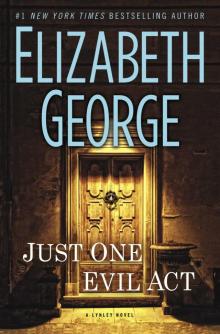 Just One Evil Act
Just One Evil Act This Body of Death
This Body of Death The Edge of the Water
The Edge of the Water For the Sake of Elena
For the Sake of Elena Believing the Lie
Believing the Lie The Edge of the Shadows
The Edge of the Shadows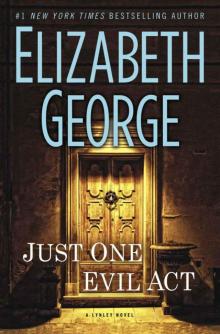 Just One Evil Act: A Lynley Novel
Just One Evil Act: A Lynley Novel In Pursuit of the Proper Sinner
In Pursuit of the Proper Sinner A Moment on the Edge:100 Years of Crime Stories by women
A Moment on the Edge:100 Years of Crime Stories by women Elizabeth I
Elizabeth I I, Richard
I, Richard A Traitor to Memory
A Traitor to Memory Missing Joseph
Missing Joseph A Suitable Vengeance
A Suitable Vengeance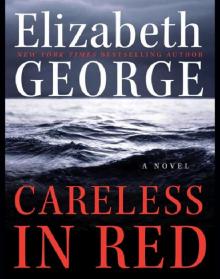 Careless in Red
Careless in Red A Banquet of Consequences
A Banquet of Consequences Playing for the Ashes
Playing for the Ashes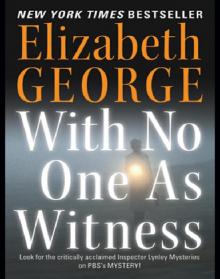 With No One As Witness
With No One As Witness Deception on His Mind
Deception on His Mind The Best American Mystery Stories 2016
The Best American Mystery Stories 2016 A Great Deliverance
A Great Deliverance In the Presence of the Enemy
In the Presence of the Enemy Believing the Lie il-17
Believing the Lie il-17 The Edge of the Light
The Edge of the Light SW01 - The Edge of Nowhere
SW01 - The Edge of Nowhere A Place of Hiding
A Place of Hiding What Came Before He Shot Her il-14
What Came Before He Shot Her il-14 Payment In Blood
Payment In Blood The Punishment She Deserves
The Punishment She Deserves This Body of Death: An Inspector Lynley Novel
This Body of Death: An Inspector Lynley Novel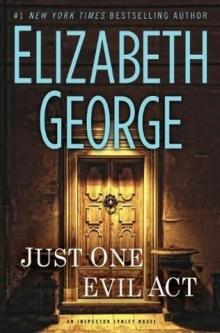 Just One Evil Act il-18
Just One Evil Act il-18 What Came Before He Shot Her
What Came Before He Shot Her Missing Joseph il-6
Missing Joseph il-6